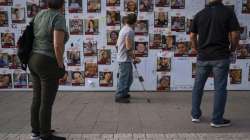Netanyahu rejects calls for ceasefire, says 'it means surrender to Hamas, won't happen'
Israeli Prime Minister Benjamin Netanyahu rejected calls for a cease-fire to facilitate the release of captives or end the war, which he has said will be long and difficult. His statement came despite UN agency saying an urgent ceasefire is "a matter of life and death'' for millions of Palestinians.

Israel-Hamas war: Israeli ground forces pushed deeper into Gaza on Monday, advancing in tanks and other armoured vehicles on the territory's main city and freeing a soldier held captive by Hamas militants. The Israeli Prime Minister rejected calls for a cease-fire, even as airstrikes landed near hospitals where thousands of Palestinians are sheltering beside the wounded.
The military said a female soldier captured during Hamas' brutal October 7 incursion was rescued in Gaza — the first since the weekslong war began. It provided few details but said in a statement that Pvt. Ori Megidish “is doing well” and has met with her family.
Netanyahu rejects calls for a ceasefire
Prime Minister Benjamin Netanyahu welcomed her home, saying the "achievement" by Israel's security forces “illustrates our commitment to free all the hostages.” He also rejected calls for a cease-fire to facilitate the release of captives or end the war, which he has said will be long and difficult.
“Calls for a cease-fire are calls for Israel to surrender to Hamas,” he told a press conference. "That will not happen.” He also said he has no plans to resign in the face of mounting anger over the failure of Israel's vaunted security forces to prevent the worst surprise attack on the country in a half-century.
Hamas and other militant groups are believed to be holding some 240 captives, including men, women and children. Netanyahu has faced mounting pressure to secure their release even as Israel wages a punishing war it says is aimed at crushing Hamas and ending its 16-year rule over the territory.
Hamas, which has released four hostages, has said it would let the others go in return for thousands of Palestinian prisoners held by Israel, including many implicated in deadly attacks on Israelis.
Israel dismisses Hamas's offer
Israel has dismissed the offer, and Netanyahu said the ground invasion “creates the possibility” of getting the hostages out, adding that Hamas will “only do it under pressure."
Hamas released a short video on Monday purporting to show three other female captives. One of the women delivers a brief statement — likely under duress — criticising Israel's response to the hostage crisis.
The military has been vague about its operations inside Gaza, including the location and number of troops. Israel has declared a new “phase” in the war but stopped short of declaring an all-out ground invasion, even as it has deployed tens of thousands of troops to the border.
The movements of recent days, including larger ground operations both north and east of Gaza City, point to a focus on the city. Israel says much of Hamas' forces and militant infrastructure, including hundreds of kilometres of tunnels, are in Gaza City, which before the war was home to over 6,50,000 people, a population comparable to that of Washington.
Though Israel ordered Palestinians to flee the north, where Gaza City is located, and move south, hundreds of thousands remain, in part because Israel has also bombarded targets in so-called safe zones. Around 117,000 displaced people hoping to stay safe from strikes are staying in hospitals in northern Gaza, alongside thousands of patients and staff, according to UN figures.
The UN agency for Palestinian refugees, known as UNRWA, says nearly 6,72,000 Palestinians are sheltering in its schools and other facilities across Gaza, which have reached four times their capacity.
The death toll among Palestinians passed 8,300, mostly women and children, the Gaza Health Ministry said Monday. The figure is without precedent in decades of Israeli-Palestinian violence. More than 1.4 million people in Gaza have fled their homes.
Over 1,400 people have died on the Israeli side, mainly civilians killed during Hamas' initial attack, also an unprecedented figure.
"Urgent ceasefire is a matter of life and death' for millions of Palestinians"
The head of the UN agency for Palestinian refugees told a UN emergency meeting on Monday “an immediate humanitarian ceasefire has become a matter of life and death for millions,” accusing Israel of “collective punishment” of Palestinians and the forced displacement of civilians.
Philippe Lazzarini warned that a further breakdown of civil order following the looting of the agency's warehouses by Palestinians searching for food and other aid “will make it extremely difficult, if not impossible, for the largest UN agency in Gaza to continue operating."
Briefings to the Security Council by Lazzarini, the head of the UN children's agency UNICEF and a senior UN humanitarian official painted a dire picture of the catastrophic humanitarian situation in Gaza 23 days after Hamas' surprise October 7 attacks in Israel, and its ongoing retaliatory military action aimed at “obliterating” the militant group, which controls Gaza.
(With inputs from agency)
